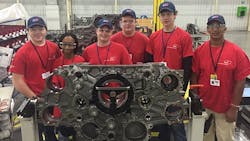Closing the Skills Gap One Apprentice at a Time
Jeremy Diebel, a manager at MTU America, grew up in a Detroit neighborhood “where on every corner there was a machine shop.” His father worked for the Big Three auto companies. Manufacturing employment was a norm. That wasn’t the case in Aiken, S.C., where MTU in 2010 decided to open a plant to produce diesel engines. So along with recruiting machinists from local shops, MTU has taken steps to keep the talent pipeline filled by launching an apprenticeship program.
MTU’s program is part of a resurgence of interest among U.S. manufacturers in apprenticeship programs and vocational education. It’s an uphill battle as the industry faces a serious skills gap resulting from years of employment declines, outsourcing and a perception among many parents and educators that manufacturing is a poor choice for America’s youth. According to the Manufacturing Institute and Deloitte, nearly 3.5 million manufacturing jobs will need to be filled over the next decade and 2 million are expected to go unfilled.
MTU’s apprentices are high school juniors and seniors, explains Diebel, MTU America’s senior manager of machining and the apprenticeship coordinator. In the spring of their sophomore year, students tour the MTU facility with their parents. MTU selects six students each year to participate in the program.
Like many other communities, parents, teachers and guidance counselors in Aiken frequently discouraged young people from pursuing a manufacturing career.
“We’re of course fighting the stereotypes of manufacturing – it’s not glamorous, it’s dirty, low-paying. Your job is going to end up in China at some point,” Diebel notes.
But once they step in the MTU facility, he says, there is a “wow factor” heard from both parents and students as they see a clean, modern facility employing 300 people in advanced manufacturing.
During the two-year program, apprentices split time between their area high school and the Aiken County Career & Technology Center. Two days a week, rather than attend the career center, they come to the MTU facility. Over the two years, says Diebel, they spend 1,000 hours on the shop floor at MTU.
MTU America is part of a Rolls-Royce unit headquartered in Germany and the apprenticeship program borrows heavily from the German experience. The training curriculum is based on German materials and the test that apprentices take at the end of the program is the same as their German peers would undergo.
“The core of our program is teaching them assembly techniques, hand tools, measurements, working with CNC machines, manual mills, manual lathes, tooling, any quality control tools they need to use. CMM lab is part of their rotation. It’s anything that is core to metalworking and metal assembly,” explains Diebel.
Equally important are the soft skills that these young people learn, says Diebel, such as coming to work on time, having a good attitude and communicating with other employees.
“These are things they need to know to work with any professional company,” Diebel notes. “We’ve lost more apprentices due to these skills than we ever did for their technical knowledge.”
The apprenticeship program operates year-round. During the summer, apprentices work 40 hours and even overtime if it is available. The students start at minimum wage and receive four increases during the course of their training. At the end of the program, MTU apprentices earn an industrial mechanic certification which qualifies them to work in any similar manufacturing plant in South Carolina.
Not all students find the apprenticeship program to their liking. The summer after their junior year frequently serves as a “culling period,” Diebel notes.
“They’re here at 6 o’clock in the morning with everyone else. They get one break, lunch, one break. This is where those soft skills really come out. They either are going to make it or they’re not,” he says.
Apprentices take three routes after finishing the program, Diebel reports. If they want to work at MTU, the company will hire them. They may also go to another company if it provides a job opportunity that suits them better. Diebel says companies appreciate these young workers because they are well-trained but still malleable in terms of company culture. And some students decide they want to pursue a four-year college degree. In those cases, MTU may offer them internships during their college years.
“No matter what path they choose, we feel like we’ve won,” says Diebel.
Along with his role as coordinator for the apprenticeship program, Diebel also serves as a mentor to the students. It’s routine for apprentices to stop by and discuss their futures with him. He says he relates easily as he faced many of the same questions at their age. One issue he addresses is that in pursuing a vocational education, they are eliminating activities that later will help them get into college. Diebel calls that “absolutely false,” noting that apprentices may end up going to college and having their employer pay for their education.
And, he notes, “The things the other kids don’t have is the ability to come in and make a family-raising wage at 18 years of age.”
Diebel lends his time to a number of activities aimed at breaking down manufacturing stereotypes, including hosting guidance counselors at the plant and showing them the opportunities available there. The plant also has a girls day event in which it brings freshman girls to the facility, provides lean training and mock assemblies, and has women employed in manufacturing speak to them. In December 2014, Nigeria Williams, a graduate of the apprenticeship program, was honored as Trainee of the Year by the German American Chambers of Commerce.
Both Gov. Nikki Haley and State Superintendent of Education Molly Spearman have visited the MTU plant to learn about the apprenticeship program. And the White House has recognized the apprenticeship program as part of its Upskill Initiative to increase and improve training for workers and help them attain better jobs.
“With small battles, we are starting to win the war,” Diebel says. “We have an extremely long way to go.”
About the Author
Steve Minter
Steve Minter, Executive Editor
Focus: Leadership, Global Economy, Energy
Call: 216-931-9281
Follow on Twitter: @SgMinterIW
An award-winning editor, Executive Editor Steve Minter covers leadership, global economic and trade issues and energy, tackling subject matter ranging from CEO profiles and leadership theories to economic trends and energy policy. As well, he supervises content development for editorial products including the magazine, IndustryWeek.com, research and information products, and conferences.
Before joining the IW staff, Steve was publisher and editorial director of Penton Media’s EHS Today, where he was instrumental in the development of the Champions of Safety and America’s Safest Companies recognition programs.
Steve received his B.A. in English from Oberlin College. He is married and has two adult children.

